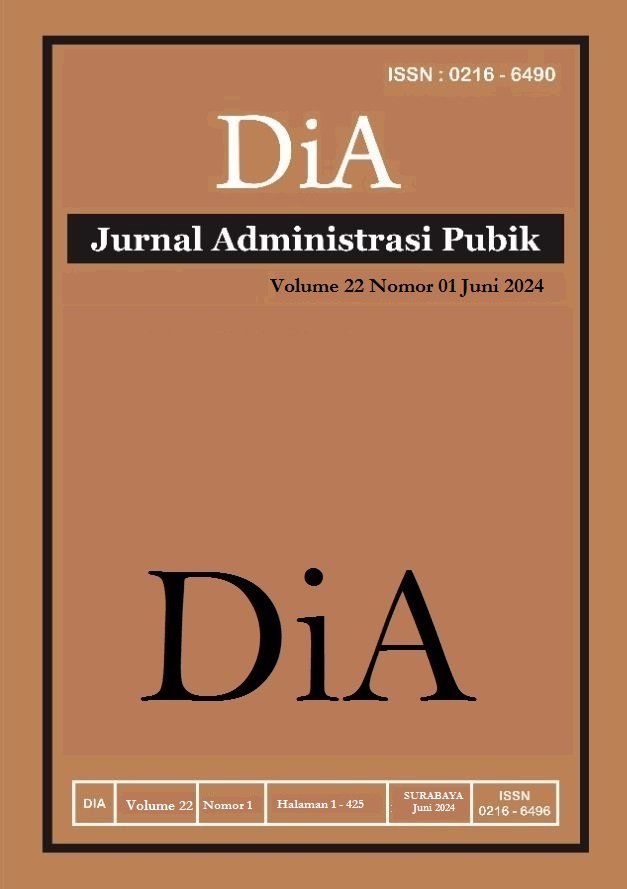GOVERNANCE OF INSTITUTIONAL WASTE MANAGEMENT IN JEMBER REGENCY
Pakusari Landfill Case Study
DOI:
https://doi.org/10.30996/dia.v22i01.8710Keywords:
Institutional, Institutional Governance, Waste Management, Jember Regency, Pakusari LandfillAbstract
Waste management at the Pakusari Final Disposal Site (TPA) in Jember Regency has yet to find a conducive waste management. This study aims to analyze the institutional governance model of waste management in Jember Regency through an institutional perspective framework according to Pavan et.al 2016. Through a case study at Pakusari TPA which is the largest TPA and accommodates the most waste, namely 17 sub-districts out of 31 sub-districts that scattered in Jember Regency but also experiencing various problems such as over capacity, rejection by the surrounding community and the behavior of the surrounding community who are still ignorant of the awareness of the importance of managing waste properly and maintaining the habit of disposing of waste in the river. Using a qualitative approach this research tries to provide an overview of how the institutional design of Pakusari TPA is in exercising its authority in solving waste problems in Jember district.
Downloads
References
Ali, H. E., & Bhuiyan, S. (2022). Institutional Reforms, Governance, and Services Delivery in the Global South. In International Series on Public Policy. https://doi.org/10.1007/978-3-030-82257-6_1
Brandsen, T., Steen, T., & Verschuere, B. (2018). Co-Production and Co-Creation. InCo-ProductionandCo-Creation. https://doi.org/10.4324/9781315204956
Chung, K. H., & Zhang, H. (2011). Corporate governance and institutional ownership. Journal of Financial and Quantitative Analysis, 46(1), 247–273. https://doi.org/10.1017/S0022109010000682
Claes, D. (2018). Institutional governance. The Politics of Oil, 96–114. https://doi.org/10.4337/9781785360183.00013
Hazardous Waste Handbook for Health and Safety. (1987). In Hazardous Waste Handbook for Health and Safety. https://doi.org/10.1016/c2013-0-06314-1
Horie, Y., Chervenak, R. P., Wolf, R., Gerritsen, M. E., Anderson, D. C., Komatsu, S., & Granger, D. N. (1997). Lymphocytes mediate TNF-alpha-induced endothelial cell adhesion molecule expression: studies on SCID and RAG-1 mutant mice. The Journal of Immunology, 159(10), 5053–5062. htTPS://doi.org/10.4049/jimmunol.159.10.5053
Khan, H. A. (2018). Globalization and the Challenges of Public Administration. In Globalization and the Challenges of Public Administration. https://doi.org/10.1007/978-3-319-69587-7
Lanoszka, A. (2022). Corporate governance and economic development: Identifying critical institutional reforms. In Corporate Governance and Economic Development: Identifying Critical Institutional Reforms. https://doi.org/10.4324/9780429443459
Matheson, A. (2001). New public management Jan-Erik Lane; London, Routledge, 2000, 256 pages paperback. In International Public Management Journal (Vol. 4, Issue 1). https://doi.org/10.1016/s1096-7494(01)00038-1
Murray, J. (2010). Qualitative Research Methods. Principles of Social Psychiatry: Second Edition, 732, 77–87. https://doi.org/10.1002/9780470684214.ch7
Njie, B., & Asimiran, S. (2014). Case Study as a Choice in Qualitative Methodology. IOSR Journal of Research & Method in Education (IOSRJRME), 4(3), 35–40. https://doi.org/10.9790/7388-04313540
Nursamsir, N., Jamaluddin, I. I., Iqbal, M., & Ismanto, I. (2022). The Social and Political Aspects of Permanent Housing Provision for Earthquake Tsunami and Liquefaction Casualties in Palu City, Central Sulawesi. JKAP (Jurnal Kebijakan Dan Administrasi Publik), 26(2), 85. https://doi.org/10.22146/jkap.54013
Pateman, C. (2014). Participation and democratic theory. Participation and Democratic Theory, 1–122. https://doi.org/10.1017/CBO9780511720444
Putra, M. A. H., Mutiani, M., Jumriani, J., & Handy, M. R. N. (2020). The Development of a Waste Bank as a Form of Community Participation in Waste Management. The Kalimantan Social Studies Journal, 2(1), 22. https://doi.org/10.20527/kss.v2i1.2460
Supranoto, -, Bin Abu Bakar, M. Z., & Bin Hamat, M. Z. (2016). Institutional Innovation in Zakah Management: The Experience of Putukrejo Village, Indonesia. Icpm, 98–100. https://doi.org/10.2991/icpm-16.2016.25
Supranoto, S., Baladdudin Dayar, M., & Faiqoh, F. (2022). Co-Production of the Provision of Public Goods by the Community in Darungan Village, Jember Regency. Iapa Proceedings Conference, 243. https://doi.org/10.30589/proceedings.2022.699
Suryani, A. S. (2014). Peran Bank Sampah Dalam Efektivitas Pengelolaan Sampah (Studi Kasus Bank Sampah Malang). Aspirasi, 5(1), 71–84. https://DPRexternal3.DPR.go.id/index.php/aspirasi/article/view/447/344
Windraswara, R., & Prihastuti, D. A. B. (2017). Analisis Potensi Reduksi Sampah Rumah Tangga Untuk Peningkatan Kualitas Kesehatan Lingkungan. Unnes Journal of Public Health, 6(2), 123. https://doi.org/10.15294/ujph.v6i2.15360
Downloads
Published
How to Cite
Issue
Section
License
The DiA journal allows authors to retain the copyright of their papers without limitation. Authors may grant publishers non-exclusive publishing rights to publish articles. Granting first publishing rights to publishers also qualifies as unlimited copyright (because there are no restrictions imposed by publishers on author copyright).







